#Japanese pronouns
Text
Guys I gotta talk about Yugioh characters' pronouns
and by pronouns I mean the second-person pronouns that they use for other people
and by yugioh characters I mean exclusively bakura
Okay so in Japanese, pronouns have synonyms. You have OPTIONS for which "you" to use for someone, and it depends on your relationship and how polite you're being:
Safest option for you, the learner, is actually to refer to them in third person, by their name (or title, or nickname). This is both nice and respectful.
貴方(あなた) is the formal polite one that's most often taught to beginners.
君(きみ) is informal and friendly-sounding, for friends! Don't use it for like your boss.
お前(おまえ) is informal and rough-sounding, like walking up to someone and going "hey man"
てめぇ is actively insulting. You are possibly picking a fight. Either this is a close friend who likes tossing around friendly insults, or you want them to meet you behind the denny's for an asskicking. Maybe both.
貴様(きさま)is also insulting. Was once a polite term that got used SO SARCASTICALLY that now it's almost like saying A POX ON YOUR HOUSE. You are probably an anime character with anime enemies.
And fiction makes full use of all this to help you understand how characters feel about each other.
For example, in Yugioh we have Ryou Bakura, a decently polite and mild-mannered teenager. He says the friendly-sounding 君 to most people, at least when he's not just using their names/titles.
He is possessed by the evil spirit Yami Bakura, who is allergic to respect and has a standing invitation to literally anyone to meet him behind the denny's for an asskicking. Yami Bakura only says 君 when he is pretending to be the nice Bakura. When he's being himself he actually defaults to a mix of てめぇ and 貴様, the insulting ones.
But the part I like is their use of お前.
See, Yami Bakura is a guy who says お前 to be nice. Or at least as nice as he's capable of being. In his hands it can end up sounding creepily familiar, like "hey buddy we're cool right? you don't mind the murder do you pal?"
He'll say お前 occasionally to a lot of people, but I can only think of one that he uses it consistently for, and that's his host. Even when he's mad at him.
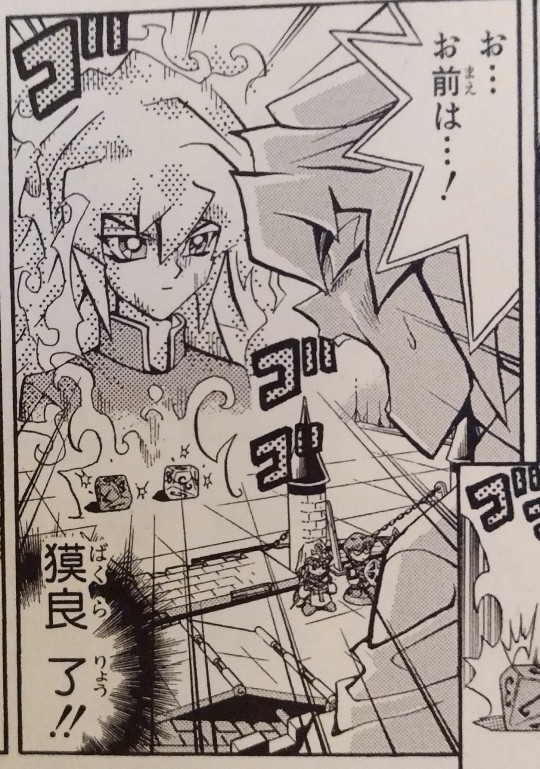
お...お前は...! 獏良了!!
(Y-You're... Bakura Ryou!!)
Ryou Bakura, meanwhile, also uses お前 for exactly one person as far as I can tell. And that person is Yami Bakura. The demon living in his brain doesn't get the friendly "you."
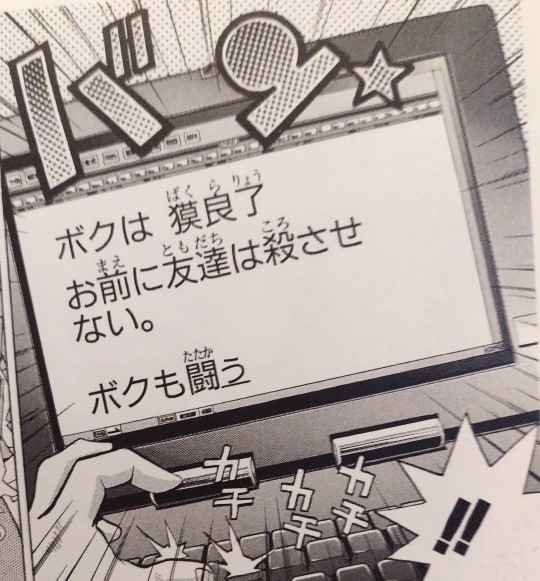
ボクは獏良了。お前に友達は殺させない。ボクも闘う。
(This is Bakura Ryou. I won't let you kill my friends. I'll fight too.)
It's just so hilarious to me that they use the same "you" for each other, but one says it to be "nice" and the other says it to be mean. Like that's great. Isn't that great??
11/10 they should have interacted for more than like three scenes
#yugioh#Japanese pronouns#the way they talk is like a venn diagram. except it's just two circles barely touching. one pixel of overlap. love that.
1K notes
·
View notes
Note
Random question, what Japanese pronouns would the characters use?
I have the feeling that I've discussed this with my friends at some point. But my Japanese is user level, so I don't know too much, I know that Sans uses "oira" if I'm not wrong.
Let's say they would use the same ones from the original game, and for the other characters… I think Lytta/Erin would use "boku". Thanatos/Ethan is very correct, so he uses "watashi". And Gaster will probably use "watashi" too, mayhaps he could use "watashi-sama" when he's Eternal…? Because he really thinks he's the most powerful god and blahblah. Lynsans… I find "boku" cute for them too. Wait, I think it would be funny if Maddy uses "atashi" when she's being cute and when she's mad she uses "ore" with extra "rrrr" (?).
23 notes
·
View notes
Text
Round 1, poll 2
Vote for whichever you think is best!
Evidence/Propaganda under the cut
Japanese pronouns:
-In the Japanese localization, the same pronoun (jibun) is used for both the pacifist mirror dialogue (It's you/despite everything, it's still you/still just you, Frisk) and the geno mirror dialogue (It's me, Chara). This is yet another way of making sure there's is no barrier between the pacfist/neutral and geno narration.
flavor text in certain fights:
-you can try to tell a joke to… i think woshua and snowdrake’s mom? and it immediately gives you the most depressing ass unfunny joke you’ve ever heard before going “what? you didn’t say that?” this is one of the only places in the game where the narrator and frisk are obviously different, and while it doesn’t specifically say that the narrator is chara it certainly implies that the narrator is not an unbiased entity. narrachara from there is a much smaller leap of logic
11 notes
·
View notes
Text

i couldn't find any neat source on the pronouns characters use so i made my own.
i'm not an expert on japanese pronouns, but i think in general it goes like this:
ore - more masculine/confident vibe, used among male peers
boku - more polite and less "threatening" i'll say. in anime usually used by less confident characters
so among the boku users: onoda has low confidence, we know izumida is a goody two shoes, and komari was raised in a strict environment so it fits all of them
i think it's endlessly amusing that midousuji-kun uses boku... because he is NOT known to be polite (he calls his seniors by -kun) so instead it gives him a very boyish charm. i think i read somewhere that younger boys usually use boku? idk idk that's the vibe i'm getting and it's very cute
4 notes
·
View notes
Text
The other day, I finally downloaded Hepburn's 1872 Japanese-English dictionary from the Internet Archive to keep on hand as a reference. Sometimes you just need words that may be difficult to locate in a modern dictionary because they're just no longer in common use.
That reminded me of a post about Sannan Keisuke's only known surviving letter, which I'm sure I've shared previously (but of course can't find now because finding anything on tumblr requires some combination of luck and magic).
In the commentary about the letter, fushigi-dono writes:
"However, even from this little note you can learn something new about the second Vice-Commander of Shinsengumi. For example, Sannan calls himself 下拙 (gesetsu, 下 - low, 拙 - bad / inept). I have never met such a personal pronoun. It is similar to 拙者 (sessha - a bad, inept person), which was used mainly by samurai (Kondo constantly, Okita sometimes, Hijikata never), but not the same. It’s special.”
It is true that sessha, a pronoun that was commonly used by samurai when speaking to one another, is still easy to find in modern dictionaries. For example, here. It's an archaism and not used nowadays outside of period drama, but it's not unknown.
Gesetsu, on the other hand, is not in the same dictionary. So is it unique to Sannan or was it at one point in common use, but perhaps not quite as common as sessha?
Here's what Hepburn has to say on the subject:

Here, sessha, gesetsu, and kono-ho (another one I don't remember seeing before) are listed as three personal pronouns that are used among samurai when speaking to one another. Since he's listed all three, I would assume that all three must have been in common use - perhaps with differences in regional use or personal preference.
#language notes#japanese pronouns#historical japanese pronouns#history notes#historical notes#history reference#historical reference#history research#historical research#sannan keisuke#yamanami keisuke#hepburn dictionary
35 notes
·
View notes
Text
Here's a random take:
'Ore' is the most attractive pronoun in Japanese.
'Boku' is pretty close, though. And I have a soft spot for 'oresama' characters, too, but idk if real people use it.
It's just that characters who use 'ore' are 👌🏻 I love the boyish charm it adds? Wikipedia says it "establishes a sense of masculinity".
I just
Eugh
I love voices and the pronoun adds to it :>
#SDB rambles#japanese#anime#japanese pronouns#no this is not caused by tears of themis shut up#i'm just taken by vyn and his surprising use of boku and not the professional watashi like artem#but eugh marius and luke both use ore i assume?#eugh just#voice actors#i was watching a new anime and the male lead was kaito ishikawa and i had a physical reaction to his first line#threw my head back and squeaked like an idiot#also when he laughed#i'm a lost cause aren't i
3 notes
·
View notes
Text
kiriko goes by "ore"
OH DAMN.
Ore is the masc-est Japanese pronoun*.
I assumed she used boku, the normal dude pronoun, but ore. damn...
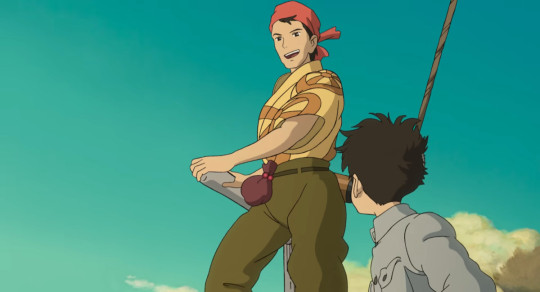
#once a weeb always a weeb#I went out of my way to google this#I watched the dub#kiriko#the boy and the heron#butch#japanese pronouns are really fun if you aren't familiar with them#*ore is the masc-est first person pronoun#there might be masc-er third person pronouns#it's complicated
1K notes
·
View notes
Text

bonney normally speaks very coarsely- she usually uses omae as her ‘you’ pronoun, which is uncommonly rude and aggressive for women and is normally only used by men. however, when she addresses luffy-as-nika for the first time directly, to say “i’ve been searching for you,” she switches over to anta for ‘you’, which is still informal but far less confrontational.
and then when luffy is just completely not getting it in the next line (“huh? we’ve been together this whole time!”) bonney instantly snaps back to using omae again for her subsequent lines. respect gained -> lost speedrun INSTANT
#one piece#japanese#jonny reads op#op#luffy#bonney#ch 1107#arc: egghead island#the pronoun game#opspoilers#gear 5
898 notes
·
View notes
Text
Unsurprisingly, people are already being fucking weird about Mizu's gender.
Headcanons are all well and good, but maybe we shouldn't be so eager to apply modern Western gender politics and terms to a character whose identity is so tied to the time, place, and circumstances in which she exists.
Please remember that Mizu was forced to present as male for her own safety and agency. Please remember that allowing others to see her as a man and call her he/him is not a choice; it's protection; it's a means to an end. Until we see Mizu talk about her gender in further detail, that's all the context we have.
Don't project what you want to see onto her and then treat it as fact.
#Blue Eye Samurai#BES#Svar rants#also as an enby who doesn't use they it super rubs me the wrong way to see people insisting on calling her they#even if she *is* genderqueer or nonbinary (and we don't know that she is) that does not mean that they automatically applies#and if you think that it does please go back to Gender 101 do not pass go do not collect $100#on top of that there's the whole issue of applying English pronoun politics to a Japanese speaker#like I'm begging y'all to consider cultural and historical context before y'all go gallivanting off with your readings of Mizu's gender#taking a baseball bat to a hornet's nest with this one I know but I'm Bothered
597 notes
·
View notes
Text
as far as being a trans person in japan goes, despite all of the difficulties that come with that, I think one of the most accommodating things has been... just the nature of pronouns themselves, in the language.
sure, literal translations of gendered third person pronouns exist (彼 and 彼女, kare and kanojo, he and she respectively), but... like, nobody uses them. for one, they're both words for "boyfriend" and "girlfriend" respectively (even if 彼氏, kareshi, is more common than just 彼), so you run the risk of a... rather awkward miscommunication. but, perhaps more pertinently, it's much more common to just use a person's name or title.
on the other hand... you know what does have gendered nuance and is commonly used? the word "I." or, more precisely, all the different first person pronouns in the language.

just by saying "I," "me," or "my," you can... so seamlessly make a statement about yourself and your identity in the middle of nearly any sentence.
queer people use this to express their gender identity. queer people use this to express their subversion of gender roles, too. in retrospect, it makes saying "my name is [name] and my pronouns are [pronouns]" feel so clunky when I can just... move on to my next idea, and just casually convey similar information!
speaking english in the states, i feel like it can be dangerous, sometimes, to introduce yourself with your pronouns, especially when the whole point is to greet people you're meeting for the first time. best case scenario, it's like, oh, those are your pronouns, that's cool. worst case scenario, it's "oh, pronouns? you're one of those trannies, aren't you?" much more commonly, though, is "oh he identifies as a woman," which Makes Me Want To Tear My Hair Out All The Time Why.
when i'm in japan, though, I can just be me, and simply, casually, refer to myself as such. and I think that's pretty cool.
(for more on queerness and gendered language in japanese that delves into A Whole Lot More Nuance, check out this tofugu article)
#that being said you still shouldnt overuse the first person pronoun in sentences where its contextually obvious if you wanna sound fluent ww#japanese#language#lgbt#trans#linguistics#rambles
445 notes
·
View notes
Text
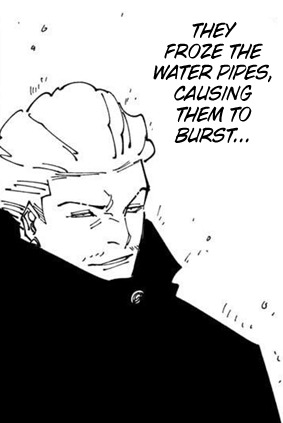
if Hakari can use they/them for Uraume, then so can you
#or no pronouns in case of the original Japanese but that's a little hard to do in English#jjk spoilers#jjk 245#uraume
132 notes
·
View notes
Text

SO THERE'S THIS GENDERLESS REAPER
#we won#google translate put random pronouns cause japanese doesn't work like that#so zero still uses she/her as far as we know#but still a massive win#ffxiv#zero
586 notes
·
View notes
Text
Under the cut is every single submission I have so far


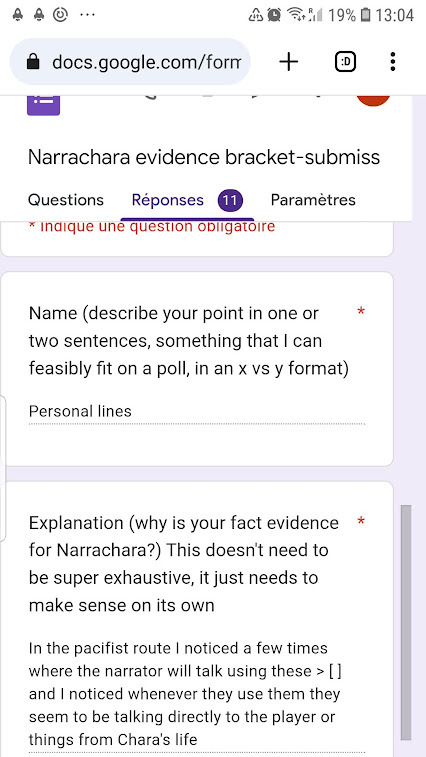

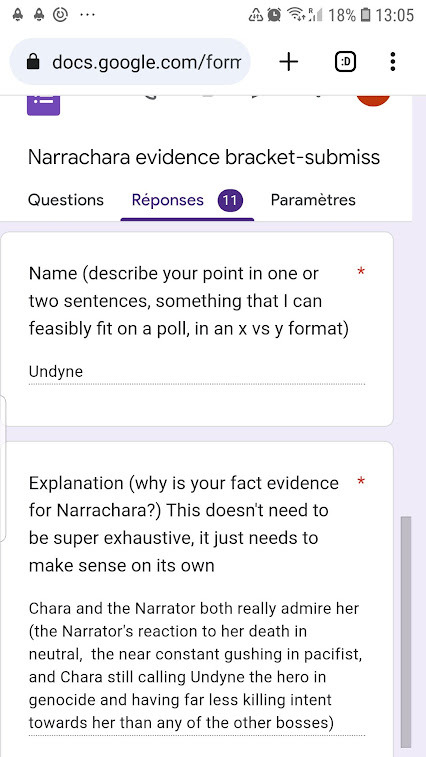

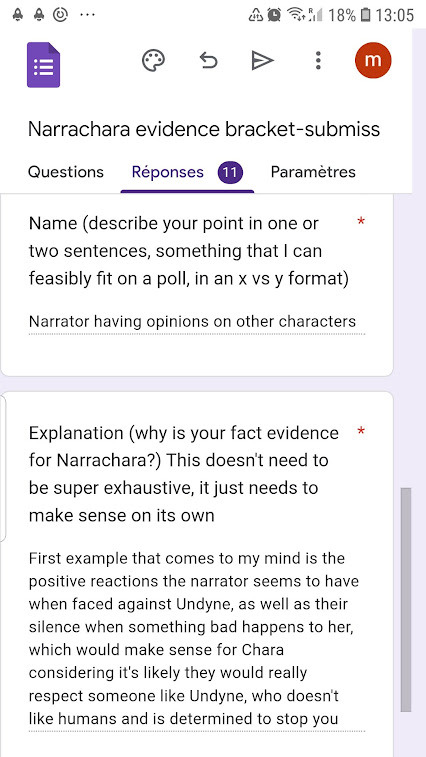

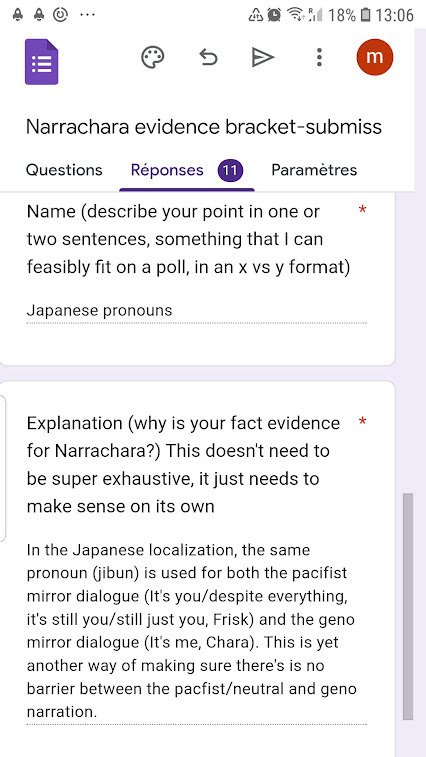

I really think we're getting somewhere now!
#long post#yes I'm sharing these so I can start finding the screenshots what of it#genocide lines#personal lines#undyne#serious mode#flavour text in certain fights#japanese pronouns#no narration in photoshop flowey fight
12 notes
·
View notes
Text

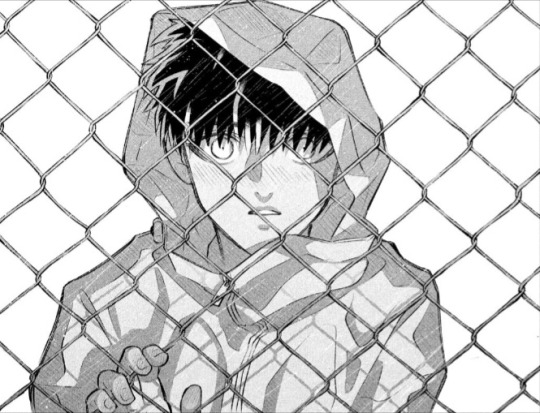
--Raise wa Tanin ga Ii chapter 35: 君は人生 (1)
#the title of this chapter is incredible#but it confuses me bcs typical japanese doesn't have pronouns#kimi wa jinsei#you are THE life?#you are MY life??#which one is it#raise wa tanin ga ii#rwtgi#rwtgi ch 35#miyama kirishima#yoshino somei#kirishima x yoshino#anyways#HYPE
329 notes
·
View notes
Note
I was disappointed that Haruhi was treated like a girl by the host club members. Anyway I’m trans now 👍
this is actually probably another example of cultural disconnect irt ouran! I don't blame you for it because if im right about where you're coming from, it's a linguistic thing and unless you understand japanese/how japanese works it's not a connection you're going to make. I think that much of what english-speaking fans percieve as haruhi being treated like a girl by the hosts, aside from tamaki's obvious Thing about her gender, is the constant use of she/her pronouns. Most of the hosts (sans tamaki) don't go out of their way to treat her like a girl in terms of like, social context, aside from a few bits that are implied to be instigated by tamaki (i.e. lobelia academy plot.) I will admit that the she/her-ing of haruhi is pervasive in the english translations of the show, but it's not actually an accurate reflection of the original content. Conversational japanese largely drops gendered pronouns from most sentences, meaning there's very little overt gendering of haruhi either way by most characters in the show. this is part of the reason why it's somewhat believable that she managed to pass herself off as a guy--it's actually entirely possible that she didn't KNOW that people were assuming she was male until the hosts made a big deal out of it, because it's unlikely she would be referred to by gendered pronouns in conversation with her peers. this is unfortunately one of those things that it's almost impossible to not lose in translation since english sentence structure relies so heavily on gendered pronouns, but i do think it's worth pointing out that in the original japanese the boys WEREN'T openly calling her a girl at every turn. except for tamaki who absolutely was but that's like his own whole seperate thing
#my least favorite anime scene is the beach episode argument bc i will never understand why they made that shit all about her being a girl.#in the manga it was very much more of an issue of her refusing to call for help when she needed it than a 'you are a weak female' situation#anyway. irt the japanese pronoun stuff the pronoun that IS commonly used on her is the one she uses for herself#which IS a traditionally male pronoun but is also stereotypically used by like. tomboy girls girls who dont care abt gender etc#which is another reason people assumed she was male. she was using a technically masculine pronoun on herself#but not in like a 'i am a boy' way in like a 'who gives a shit' kinda way. yknow#asks
350 notes
·
View notes
Text


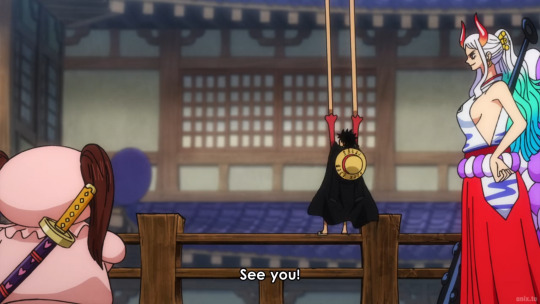
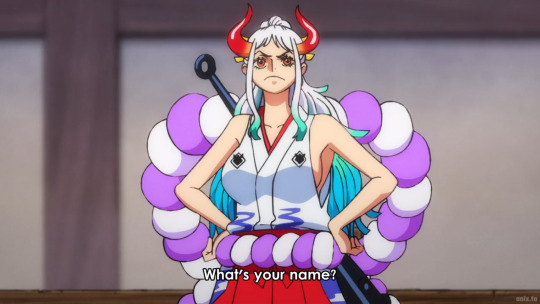
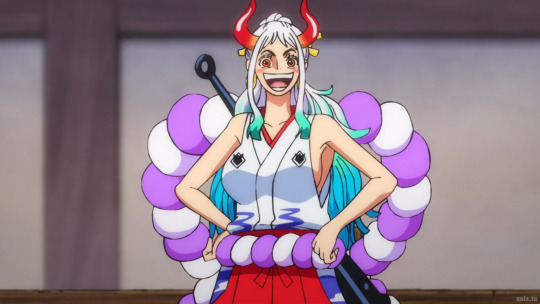


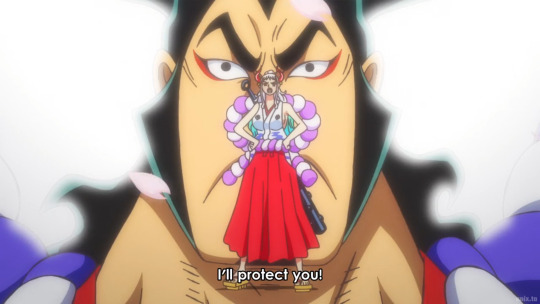
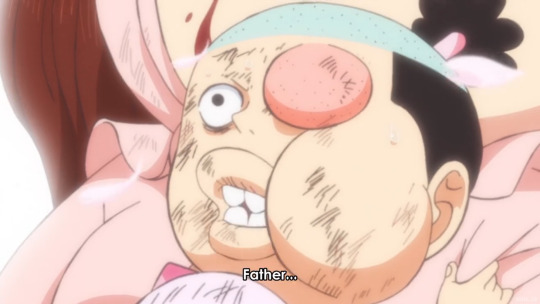
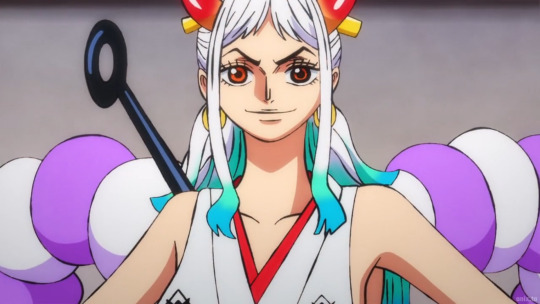
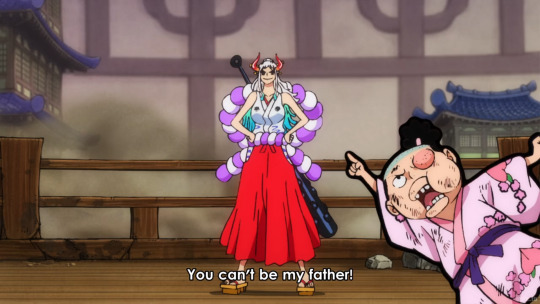
this scene in wano where luffy pushes yamato towards momonosuke and dips. and yamato being so excited for every opportunity (but this one especially) to introduce himself properly as oden! it's so good!
#one piece#monkey d. luffy#yamato#kozuki momonosuke#kozuki oden#shinobu#wano spoilers#wano#mine#long post#one piece ep 999#i was going through some of my screenshots and this was just really funny to see again#also nice to see luffy immediately respecting yamato and his pronouns (idk how it is in japanese but even the subtitles are great to see)#trans yamato#gif:op anime#one piece transgender
65 notes
·
View notes